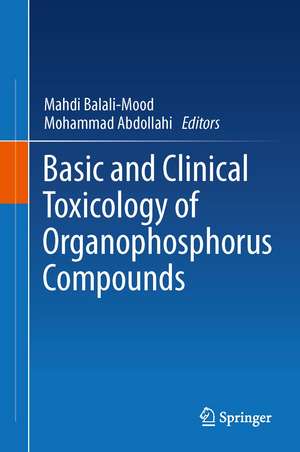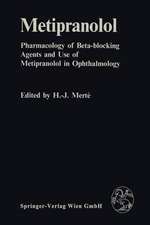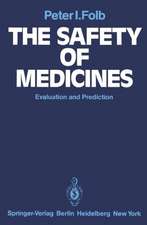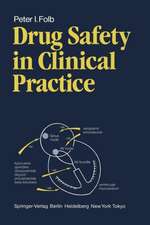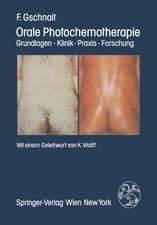Basic and Clinical Toxicology of Organophosphorus Compounds
Editat de Mahdi Balali-Mood, Mohammad Abdollahien Limba Engleză Hardback – 10 ian 2014
| Toate formatele și edițiile | Preț | Express |
|---|---|---|
| Paperback (1) | 1029.91 lei 6-8 săpt. | |
| SPRINGER LONDON – 23 aug 2016 | 1029.91 lei 6-8 săpt. | |
| Hardback (1) | 721.40 lei 6-8 săpt. | |
| SPRINGER LONDON – 10 ian 2014 | 721.40 lei 6-8 săpt. |
Preț: 721.40 lei
Preț vechi: 759.37 lei
-5% Nou
Puncte Express: 1082
Preț estimativ în valută:
138.04€ • 144.64$ • 114.11£
138.04€ • 144.64$ • 114.11£
Carte tipărită la comandă
Livrare economică 12-26 aprilie
Preluare comenzi: 021 569.72.76
Specificații
ISBN-13: 9781447156246
ISBN-10: 1447156242
Pagini: 239
Ilustrații: XII, 257 p. 31 illus., 6 illus. in color.
Dimensiuni: 155 x 235 x 17 mm
Greutate: 0.56 kg
Ediția:2014
Editura: SPRINGER LONDON
Colecția Springer
Locul publicării:London, United Kingdom
ISBN-10: 1447156242
Pagini: 239
Ilustrații: XII, 257 p. 31 illus., 6 illus. in color.
Dimensiuni: 155 x 235 x 17 mm
Greutate: 0.56 kg
Ediția:2014
Editura: SPRINGER LONDON
Colecția Springer
Locul publicării:London, United Kingdom
Public țintă
Professional/practitionerCuprins
Chemistry and classification of OP compounds.- History of use and epidemiology of organophosphorus poisoning.- Acute toxicity of organophosphorus compounds.- Chronic toxicity of organophosphorus compounds.- Toxicity and novel biomarkers of OP exposure.- Clinical management of acute OP pesticide poisoning.- Clinical management of organophosphorus nerve agents’ poisonings.- Occupational and environmental aspects of organophosphorus compounds.- Summary, discussion and conclusions.
Notă biografică
Mahdi Balali-Mood attendedTehran University, where he was awarded a B.Sc. First-Class Honor in Chemistryin 1963 and then an M.D. in 1970. After his medical military service andtraining in internal medicine and clinical toxicology, he was appointed anassistant professor in clinical toxicology and became the head of his newlyestablished Poisoning Treatment Center (PTC) at Mashhad University in 1974. Hewas awarded a scholarship from the Ministry of Science of Iran and completedhisPh.D. in clinical pharmacology and toxicologyat Edinburgh University Medical School (1978–1981). He continued at the schoolas a lecturer until 1982, when he decided to return to Mashhad to advance his establishedPTC.
Dr. Balali-Mood was promoted to associateprofessor and then full professor of medicine and clinical toxicology at theMashhad University of Medical Sciences (MUMS) in 1984 and 1988, respectively.He has served as a clinical toxicology adviser to theInternational Programme on Chemical Safety (IPCS) and the World HealthOrganization from 1989 to the present. He has also been a member of the IPCSProgramme Advisory Committee since 2000.
Dr. Balali-Mood was a founding memberand the first president of the Iranian Society of Toxicology and was twice electedpresident of Irantox between 1989 and 2001. Hehas been a
member of the Iranian Academy of MedicalSciences since its establishment in 1990. Incollaboration with a group of internationally recognized medical toxicologists,he founded the Asia-Pacific Association of Medical Toxicology (in 1989) andserved as the organization’s first vice president and then as its president for8 years (1994–2001). He was elected as a permanent member of the Academy ofSciences for the Developing World in 1997. He was also a member of theScientific Advisory Board of the Organization for the Prohibition of ChemicalWeapons from 2004 to 2011. Additionally, he is the co-founder of the Medical Toxicology Research Centre,Faculty of Medicine, Mashhad University of Medical Sciences, where he hasserved as director since 1988. He is also Editor-in-Chiefof the Scientific Journal of BirjandUniversity of Medical Sciences (since 2002) and an associate editor oreditorial board member of numerous national and internationalmedical journals.
Dr. Balali-Mood’s research areas include clinicaltoxicology of chemical warfare agents, organophosphorous pesticide poisonings,heavy metals, drug abuse and overdosage, epidemiology of poisonings, occupationaland environmental toxicology, and natural toxins, including snake and spider venoms.He is the author or editor of 29 books and bookchapters, 147 articles, and 289 short papers and abstracts. He is also the recipient of several national and internationalprizes for teaching, research, and medical care.
Mohammad Abdollahi earned a Pharm.D. in 1988 from the Universityof Tehran and later completed a Ph.D. in toxicology and pharmacology in 1994 atthe Tehran University of Medical Sciences. In 2001, Dr. Abdollahi completed hispostdoctoral training in mechanistic toxicology at the University of Toronto’s Schoolof Pharmacy. While in Toronto, he also contributed to a key meta-analysis studyat the university’s School of Medicine. In 2002 he was given a full professorshipat the Tehran University of Medical Sciences. There he has chaired theDepartment of Toxicology and Pharmacology in theFaculty of Pharmacy since 2005.
Dr. Abdollahi has authored or coauthored more than 600 journalarticles and 48 book chapters and has edited 11 books. He is theEditor-in-Chief of DARU Journal ofPharmaceutical Sciences and the Journalof Medical Hypotheses and Ideas. Additionally, he has served on theScientific Advisory Board of the Organization for the Prohibition of ChemicalWeapons (since 2012); as a member of the World Health Organization’s GuidelinesDevelopment Group for the Prevention of Lead Poisoning (since 2011); as acouncil member of the Committee on Publication Ethics (2013–2014); as Iran’scountry correspondent to the World Library of Toxicology (since 2008); as afellow of the Islamic-World Academy of Sciences (since 2007); on the Board ofDirectors of the Iran Chapter of the International Society of Pharmacoeconomicsand Outcomes Research (since 2013), of which is also a founding member; and onthe Board of Directors of the Asian Council of Science Editors (since 2014).
Dr. Abdollahi is the recipient of numerous awards, includingthe prestigious award of IAS-COMSTECH in the field of pharmacology and toxicology(2005). His main research interests are mechanistic and environmentaltoxicology, evidence-based medicine, and pharmacology.
Dr. Balali-Mood was promoted to associateprofessor and then full professor of medicine and clinical toxicology at theMashhad University of Medical Sciences (MUMS) in 1984 and 1988, respectively.He has served as a clinical toxicology adviser to theInternational Programme on Chemical Safety (IPCS) and the World HealthOrganization from 1989 to the present. He has also been a member of the IPCSProgramme Advisory Committee since 2000.
Dr. Balali-Mood was a founding memberand the first president of the Iranian Society of Toxicology and was twice electedpresident of Irantox between 1989 and 2001. Hehas been a
member of the Iranian Academy of MedicalSciences since its establishment in 1990. Incollaboration with a group of internationally recognized medical toxicologists,he founded the Asia-Pacific Association of Medical Toxicology (in 1989) andserved as the organization’s first vice president and then as its president for8 years (1994–2001). He was elected as a permanent member of the Academy ofSciences for the Developing World in 1997. He was also a member of theScientific Advisory Board of the Organization for the Prohibition of ChemicalWeapons from 2004 to 2011. Additionally, he is the co-founder of the Medical Toxicology Research Centre,Faculty of Medicine, Mashhad University of Medical Sciences, where he hasserved as director since 1988. He is also Editor-in-Chiefof the Scientific Journal of BirjandUniversity of Medical Sciences (since 2002) and an associate editor oreditorial board member of numerous national and internationalmedical journals.
Dr. Balali-Mood’s research areas include clinicaltoxicology of chemical warfare agents, organophosphorous pesticide poisonings,heavy metals, drug abuse and overdosage, epidemiology of poisonings, occupationaland environmental toxicology, and natural toxins, including snake and spider venoms.He is the author or editor of 29 books and bookchapters, 147 articles, and 289 short papers and abstracts. He is also the recipient of several national and internationalprizes for teaching, research, and medical care.
Mohammad Abdollahi earned a Pharm.D. in 1988 from the Universityof Tehran and later completed a Ph.D. in toxicology and pharmacology in 1994 atthe Tehran University of Medical Sciences. In 2001, Dr. Abdollahi completed hispostdoctoral training in mechanistic toxicology at the University of Toronto’s Schoolof Pharmacy. While in Toronto, he also contributed to a key meta-analysis studyat the university’s School of Medicine. In 2002 he was given a full professorshipat the Tehran University of Medical Sciences. There he has chaired theDepartment of Toxicology and Pharmacology in theFaculty of Pharmacy since 2005.
Dr. Abdollahi has authored or coauthored more than 600 journalarticles and 48 book chapters and has edited 11 books. He is theEditor-in-Chief of DARU Journal ofPharmaceutical Sciences and the Journalof Medical Hypotheses and Ideas. Additionally, he has served on theScientific Advisory Board of the Organization for the Prohibition of ChemicalWeapons (since 2012); as a member of the World Health Organization’s GuidelinesDevelopment Group for the Prevention of Lead Poisoning (since 2011); as acouncil member of the Committee on Publication Ethics (2013–2014); as Iran’scountry correspondent to the World Library of Toxicology (since 2008); as afellow of the Islamic-World Academy of Sciences (since 2007); on the Board ofDirectors of the Iran Chapter of the International Society of Pharmacoeconomicsand Outcomes Research (since 2013), of which is also a founding member; and onthe Board of Directors of the Asian Council of Science Editors (since 2014).
Dr. Abdollahi is the recipient of numerous awards, includingthe prestigious award of IAS-COMSTECH in the field of pharmacology and toxicology(2005). His main research interests are mechanistic and environmentaltoxicology, evidence-based medicine, and pharmacology.
Textul de pe ultima copertă
This book explains the chemistry of organophosphorus compounds (OPs), their mechanism of toxicity and the history of OPs from their initial discovery to the development of new compounds such as Novichoks. It details the harmful effects to human health both as a result of acute and chronic OP exposure and the necessary clinical management of affected patients to reduce their toxic side effects. The book also explains the detrimental effect that OPs have had on the environment and the efforts being made to prevent this in the future. Finally, the book looks at the incidents where OPs have been used as chemical warfare agents. Basic and Clinical Toxicology of Organophosphorus Compounds aims to act as a comprehensive guide to all aspects of OPs and is a key resource for clinical toxicologists and related health professionals involved in the prevention, diagnosis and clinical management of OP patients, toxicologists and other scientists involved in research on OPs including regulatory issues and postgraduate students in toxicology and related fields.
Caracteristici
A comprehensive reference for clinical toxicologists and emergency physicians involved in teaching and research on the health effects of organophosphorus compounds Provides updated information on different aspects of organophosphorus compounds including neurological complications of exposure A basic guide to organophosphorus compounds for regulatory authorities in agriculture, works, environment, industries, military and health Includes supplementary material: sn.pub/extras
